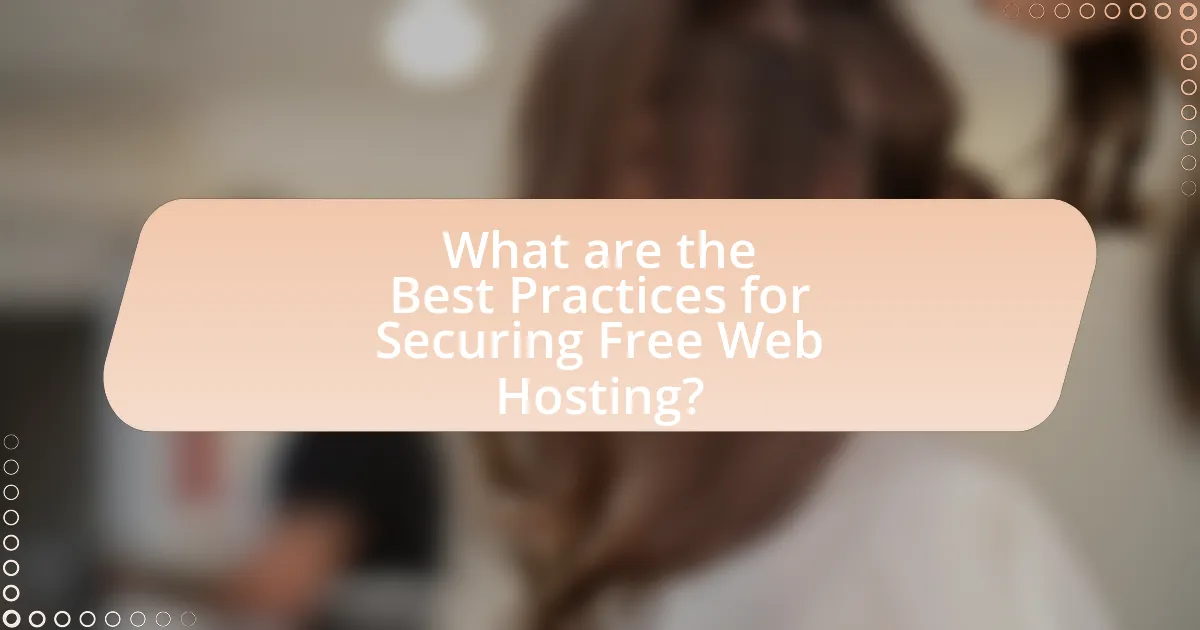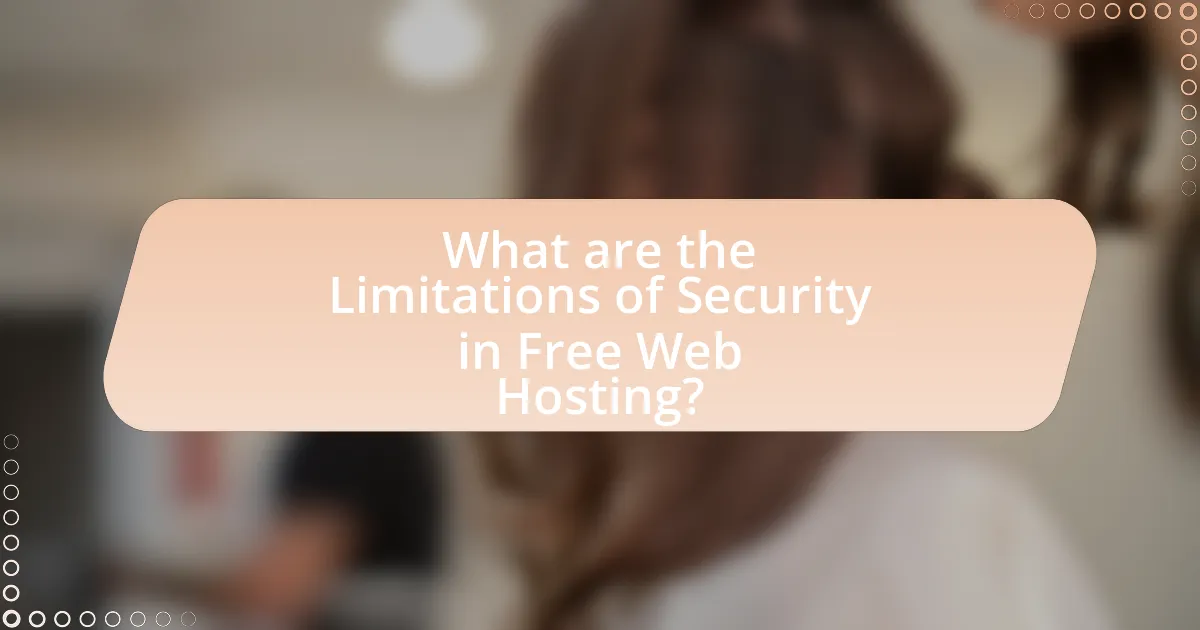The article focuses on the security features of free web hosting options, highlighting their limitations compared to paid services. It discusses common security measures such as basic SSL certificates, firewalls, and regular backups, while noting the absence of advanced protections like DDoS mitigation and malware scanning. The article also examines user authentication methods, common vulnerabilities, and best practices for enhancing security on free hosting platforms. Additionally, it emphasizes the importance of strong passwords, two-factor authentication, and regular software updates in mitigating risks associated with free web hosting services.

What are the Security Features of Free Web Hosting Options?
Free web hosting options typically offer limited security features compared to paid services. Common security features include basic SSL certificates for encrypted connections, firewalls to protect against unauthorized access, and regular backups to prevent data loss. However, many free hosting providers may lack advanced security measures such as DDoS protection, malware scanning, and dedicated customer support for security issues. According to a 2021 study by HostingAdvice, 70% of free hosting services do not provide adequate security protocols, making them vulnerable to cyber threats.
How do free web hosting services ensure data protection?
Free web hosting services ensure data protection primarily through the implementation of basic security measures such as data encryption, regular backups, and limited access controls. These services often utilize Secure Socket Layer (SSL) encryption to protect data transmitted between users and the server, which helps prevent unauthorized access during data transfer. Additionally, many free hosting providers perform regular backups of user data to safeguard against data loss due to server failures or cyberattacks. Access controls are also enforced to restrict unauthorized users from accessing sensitive information, thereby enhancing overall data security. These measures collectively contribute to a foundational level of data protection, although they may not be as robust as those offered by paid hosting services.
What encryption methods are commonly used in free web hosting?
Common encryption methods used in free web hosting include SSL (Secure Sockets Layer) and TLS (Transport Layer Security). These protocols encrypt data transmitted between the user’s browser and the web server, ensuring that sensitive information remains secure during transfer. SSL and TLS are widely adopted due to their effectiveness in protecting against eavesdropping and man-in-the-middle attacks, making them essential for maintaining user privacy and data integrity in free web hosting environments.
How does user authentication work in these services?
User authentication in free web hosting services typically involves verifying a user’s identity through a combination of username and password credentials. When a user attempts to access the service, they must enter their credentials, which are then compared against stored data in a secure database. If the entered information matches the stored credentials, access is granted; otherwise, it is denied.
Many services enhance security by implementing additional measures such as two-factor authentication (2FA), which requires users to provide a second form of verification, such as a code sent to their mobile device. This multi-layered approach significantly reduces the risk of unauthorized access. According to a study by Google, enabling 2FA can block 99.9% of automated attacks, underscoring its effectiveness in user authentication processes.
What are the common vulnerabilities associated with free web hosting?
Common vulnerabilities associated with free web hosting include lack of security updates, limited customer support, and shared resources that increase exposure to attacks. Free web hosting providers often do not prioritize regular security patches, leaving websites susceptible to exploits. Additionally, the absence of dedicated support can hinder timely responses to security incidents. The shared nature of resources means that if one site on a server is compromised, others can be affected, amplifying the risk of data breaches and malware infections. These factors collectively contribute to a heightened vulnerability landscape for users of free web hosting services.
How can users identify potential security risks?
Users can identify potential security risks by conducting regular security assessments and monitoring their web hosting environment. Regularly reviewing access logs, updating software, and using security tools like vulnerability scanners can help detect unusual activities or weaknesses. According to a report by the Cybersecurity & Infrastructure Security Agency, 85% of successful breaches exploit known vulnerabilities, emphasizing the importance of proactive monitoring and timely updates to mitigate risks.
What measures can be taken to mitigate these vulnerabilities?
To mitigate vulnerabilities in free web hosting options, users should implement strong security practices such as using HTTPS, regularly updating software, and employing robust passwords. HTTPS encrypts data transmitted between the user and the server, reducing the risk of interception. Regular software updates patch known vulnerabilities, while strong passwords prevent unauthorized access. According to a study by the Cybersecurity & Infrastructure Security Agency, 80% of data breaches involve weak or stolen passwords, highlighting the importance of this measure. Additionally, utilizing web application firewalls can provide an extra layer of protection against attacks.

What are the Best Practices for Securing Free Web Hosting?
To secure free web hosting, implement strong passwords, regularly update software, and utilize HTTPS. Strong passwords reduce the risk of unauthorized access, while software updates patch vulnerabilities that could be exploited. Using HTTPS encrypts data transmitted between the user and the server, enhancing security. According to a study by the Cybersecurity & Infrastructure Security Agency, 80% of data breaches involve weak or stolen passwords, emphasizing the importance of strong password practices. Regular updates are crucial, as 60% of breaches exploit known vulnerabilities that could be mitigated through timely updates.
How can users enhance their website security on free hosting platforms?
Users can enhance their website security on free hosting platforms by implementing strong passwords, enabling two-factor authentication, and regularly updating software. Strong passwords reduce the risk of unauthorized access, while two-factor authentication adds an extra layer of security by requiring a second form of verification. Regular software updates patch vulnerabilities that could be exploited by attackers, thereby improving overall security. According to a 2021 report by Verizon, 81% of data breaches are linked to weak or stolen passwords, highlighting the importance of robust password practices.
What role does regular software updates play in security?
Regular software updates play a critical role in security by patching vulnerabilities that could be exploited by attackers. These updates often include fixes for known security flaws, which, if left unaddressed, can lead to data breaches or system compromises. For instance, a report by the Cybersecurity and Infrastructure Security Agency (CISA) highlighted that 85% of successful cyberattacks exploit known vulnerabilities for which patches are available. Therefore, consistently applying software updates significantly reduces the risk of security incidents by ensuring that systems are fortified against the latest threats.
How important is it to use strong passwords and two-factor authentication?
Using strong passwords and two-factor authentication is critically important for securing online accounts and sensitive information. Strong passwords significantly reduce the risk of unauthorized access, as they are harder to guess or crack; for instance, a study by the National Institute of Standards and Technology (NIST) indicates that weak passwords can be compromised in seconds, while strong passwords can take years to crack. Two-factor authentication adds an additional layer of security by requiring a second form of verification, which can prevent unauthorized access even if a password is compromised. According to a report by Google, accounts with two-factor authentication enabled are 100% more secure against phishing attacks. Therefore, implementing both strong passwords and two-factor authentication is essential for enhancing security in free web hosting options.
What security features should users look for in free web hosting services?
Users should look for SSL certificates, regular backups, and malware scanning in free web hosting services. SSL certificates encrypt data between the user and the server, enhancing security during data transmission. Regular backups ensure that users can restore their websites in case of data loss or breaches, while malware scanning helps detect and remove malicious software that could compromise site integrity. These features collectively contribute to a more secure hosting environment, reducing the risk of data breaches and ensuring website reliability.
Which hosting providers offer the best security features?
Hosting providers that offer the best security features include SiteGround, Bluehost, and A2 Hosting. SiteGround provides advanced security measures such as AI-driven anti-bot systems and daily backups, which enhance protection against cyber threats. Bluehost offers free SSL certificates and a dedicated security team that monitors for vulnerabilities, ensuring a secure hosting environment. A2 Hosting features a unique security suite called “Perpetual Security,” which includes continuous monitoring and automatic updates to safeguard user data. These providers are recognized for their robust security protocols, making them reliable choices for secure web hosting.
How can users evaluate the security policies of free hosting services?
Users can evaluate the security policies of free hosting services by reviewing their terms of service, privacy policies, and security certifications. Analyzing these documents reveals how the service handles data protection, user privacy, and incident response. For instance, a reputable free hosting service may comply with standards such as ISO 27001 or GDPR, indicating a commitment to security and data protection. Additionally, users should look for transparency in how the service manages vulnerabilities and breaches, as well as the availability of features like SSL certificates and regular backups.

What are the Limitations of Security in Free Web Hosting?
The limitations of security in free web hosting include inadequate protection against cyber threats, lack of SSL certificates, and minimal customer support. Free web hosting services often do not invest in robust security measures, making websites vulnerable to attacks such as hacking and malware. Additionally, many free hosts do not provide SSL certificates, which are essential for encrypting data and ensuring secure connections. Furthermore, the absence of dedicated customer support means that users may struggle to resolve security issues promptly, leaving their sites exposed. These factors collectively contribute to a higher risk of data breaches and compromised website integrity in free web hosting environments.
Why might free web hosting options be less secure than paid services?
Free web hosting options are often less secure than paid services due to limited resources allocated for security measures. Paid services typically invest in advanced security protocols, regular updates, and dedicated support teams, which enhance protection against threats. In contrast, free hosting providers may lack these resources, resulting in outdated software, fewer security features, and a higher likelihood of vulnerabilities being exploited. For instance, a study by the University of Maryland found that free hosting services are more frequently targeted by cyberattacks, highlighting the increased risk associated with their use.
What are the trade-offs between cost and security in web hosting?
The trade-offs between cost and security in web hosting are significant, as lower-cost options often compromise security features. Budget-friendly web hosting typically lacks advanced security measures such as SSL certificates, firewalls, and regular security updates, making sites more vulnerable to attacks. For instance, a study by the Ponemon Institute found that 60% of small businesses that experience a cyber attack go out of business within six months, highlighting the risks associated with inadequate security. Conversely, higher-cost hosting services usually provide robust security protocols, including enhanced encryption and dedicated support, which can mitigate risks but at a greater financial investment. Therefore, businesses must weigh the immediate savings of cheaper hosting against the potential long-term costs of security breaches.
How does customer support impact security in free hosting services?
Customer support significantly impacts security in free hosting services by providing timely assistance and guidance to users facing security issues. Effective customer support can help users quickly resolve vulnerabilities, such as outdated software or misconfigurations, which are common in free hosting environments. For instance, a study by the Ponemon Institute found that organizations with robust customer support systems experience 30% fewer security breaches compared to those with inadequate support. This highlights the importance of responsive customer service in mitigating risks associated with free hosting services.
What should users consider before choosing a free web hosting service?
Users should consider the security features offered by a free web hosting service before making a choice. Many free hosting providers may lack essential security measures such as SSL certificates, regular backups, and malware scanning, which can leave websites vulnerable to attacks. For instance, a study by the Cybersecurity & Infrastructure Security Agency (CISA) highlights that websites without SSL encryption are more susceptible to data breaches. Additionally, users should evaluate the provider’s track record regarding data protection and privacy policies, as inadequate measures can lead to unauthorized access and data loss.
How can users assess the reliability of a free web hosting provider?
Users can assess the reliability of a free web hosting provider by evaluating uptime guarantees, user reviews, and the provider’s support options. Uptime guarantees indicate the expected availability of the service; for instance, a provider that offers a 99.9% uptime guarantee is generally more reliable. User reviews on platforms like Trustpilot or Reddit provide insights into real experiences, highlighting issues such as downtime or customer service responsiveness. Additionally, reliable providers typically offer accessible customer support, which can be verified by testing response times and support channels.
What are the long-term implications of using free web hosting for security?
Using free web hosting can lead to significant long-term security vulnerabilities. Free hosting services often lack robust security measures, making websites more susceptible to hacking, data breaches, and malware infections. For instance, a study by the University of California, Berkeley, found that free web hosting platforms frequently do not implement essential security protocols like SSL encryption, which is critical for protecting user data during transmission. Additionally, these services may not provide regular updates or patches, leaving websites exposed to known vulnerabilities. Consequently, businesses and individuals relying on free hosting may face reputational damage, loss of sensitive information, and potential legal liabilities due to inadequate security practices.
What are some practical tips for maintaining security on free web hosting?
To maintain security on free web hosting, users should implement strong passwords and regularly update them. Strong passwords reduce the risk of unauthorized access, as studies show that 81% of data breaches are linked to weak or stolen passwords. Additionally, users should enable two-factor authentication (2FA) whenever available, as it adds an extra layer of security by requiring a second form of verification. Regularly updating software and plugins is also crucial, as outdated versions can contain vulnerabilities that hackers exploit. Furthermore, users should back up their data frequently to prevent loss in case of a security breach. Lastly, monitoring website activity for unusual behavior can help identify potential threats early, allowing for timely intervention.